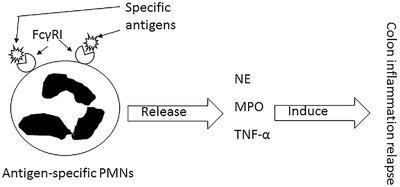当前位置:
X-MOL 学术
›
Eur. J. Immunol.
›
论文详情
Our official English website, www.x-mol.net, welcomes your
feedback! (Note: you will need to create a separate account there.)
FcγRI plays a critical role in patients with ulcerative colitis relapse
European Journal of Immunology ( IF 4.5 ) Pub Date : 2020-10-20 , DOI: 10.1002/eji.202048622 Yan Li 1, 2 , Yuan‐Yi Zhang 2, 3 , Li‐Teng Yang 3 , Jiang‐Qi Liu 4 , Chuan Zhou 1 , Zhi‐Qiang Liu 4 , Gui Yang 5 , Li‐Hua Mo 2 , Zhi‐Gang Liu 2 , Bai‐Sui Feng 1 , Ping‐Chang Yang 2, 6
European Journal of Immunology ( IF 4.5 ) Pub Date : 2020-10-20 , DOI: 10.1002/eji.202048622 Yan Li 1, 2 , Yuan‐Yi Zhang 2, 3 , Li‐Teng Yang 3 , Jiang‐Qi Liu 4 , Chuan Zhou 1 , Zhi‐Qiang Liu 4 , Gui Yang 5 , Li‐Hua Mo 2 , Zhi‐Gang Liu 2 , Bai‐Sui Feng 1 , Ping‐Chang Yang 2, 6
Affiliation

|
Ulcerative colitis (UC) is a disease that frequently relapses and affects more than 0.1% general population; the underlying mechanism is poorly understood. Published data show that polymorphonuclear neutrophils (PMN) contribute to the pathogenesis of UC. This study aims to identify antigen (Ag)‐specific PMNs and investigate their role in UC relapse. In this study, the correlation between PMN activities and UC relapse was assessed in a group of UC patients. A UC mouse model was developed to expand the findings of UC patient study. The results showed that a positive correlation was detected between the high PMN activities and the food Ag‐specific IgG amounts in colon biopsies of UC patients. UC patient‐derived Ag‐specific PMNs could be activated upon exposure to food specific Ag. The Ag/FcγRI complexes were detected on the surface of PMNs in UC patients. Re‐exposure of sensitized PMNs to specific Ag triggered PMN activation and induced UC‐like inflammation in the mouse colon. We conclude that FcγRI plays a critical role in UC relapse. Inhibition of FcγRI can efficiently inhibits experimental UC.
中文翻译:

FcγRI在溃疡性结肠炎复发患者中起关键作用
溃疡性结肠炎(UC)是一种经常复发并影响超过0.1%普通人群的疾病;根本的机制了解甚少。已发表的数据表明多形核中性粒细胞(PMN)有助于UC的发病机理。这项研究旨在鉴定抗原(Ag)特有的PMN,并研究其在UC复发中的作用。在这项研究中,评估了一组UC患者的PMN活动与UC复发之间的相关性。开发了UC小鼠模型以扩展UC患者研究的结果。结果表明,在UC患者的结肠活检中,高PMN活性与食物中的Ag特异性IgG含量之间呈正相关。UC患者源于Ag的PMN可以在暴露于食物中的Ag后被激活。在UC患者的PMN表面检测到Ag /FcγRI复合物。对敏感的PMN重新暴露于特定的Ag会触发PMN激活并在小鼠结肠中诱发UC样炎症。我们得出结论,FcγRI在UC复发中起关键作用。抑制FcγRI可以有效抑制实验性UC。
更新日期:2020-10-20
中文翻译:

FcγRI在溃疡性结肠炎复发患者中起关键作用
溃疡性结肠炎(UC)是一种经常复发并影响超过0.1%普通人群的疾病;根本的机制了解甚少。已发表的数据表明多形核中性粒细胞(PMN)有助于UC的发病机理。这项研究旨在鉴定抗原(Ag)特有的PMN,并研究其在UC复发中的作用。在这项研究中,评估了一组UC患者的PMN活动与UC复发之间的相关性。开发了UC小鼠模型以扩展UC患者研究的结果。结果表明,在UC患者的结肠活检中,高PMN活性与食物中的Ag特异性IgG含量之间呈正相关。UC患者源于Ag的PMN可以在暴露于食物中的Ag后被激活。在UC患者的PMN表面检测到Ag /FcγRI复合物。对敏感的PMN重新暴露于特定的Ag会触发PMN激活并在小鼠结肠中诱发UC样炎症。我们得出结论,FcγRI在UC复发中起关键作用。抑制FcγRI可以有效抑制实验性UC。











































 京公网安备 11010802027423号
京公网安备 11010802027423号